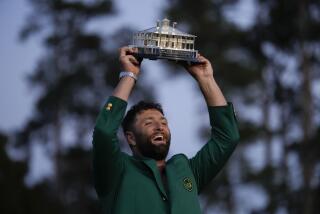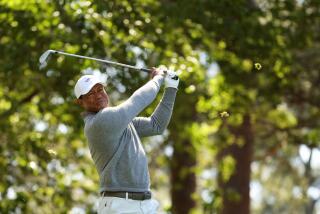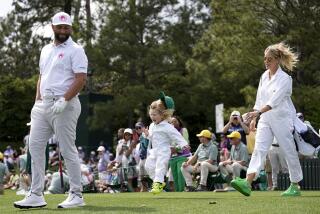Goalby played the big break just right at the ’68 Masters
Bob Goalby says he has been getting lots of phone calls the last few weeks.
“Happens every 10 years,” he says. “You guys still remember.”
He’s at Augusta National this week. The first time he played in the most revered event in golf was 1960. Now, he is there to see old friends and play some hit-and-giggle golf before the tournament starts Thursday. He’ll probably score well for a guy who turned 79 three weeks ago.
Inevitably, the subject of what happened 40 years will come up. For the first couple of years after he won the 1968 Masters when Argentine Roberto de Vicenzo signed an incorrect scorecard after the last round, the subject was a sore one for Goalby.
It was a cheap win, some wrote. Others labeled him Lucky Bob.
But now, these many years later, all that has mellowed with time and Goalby doesn’t mind talking about it at all. He is, after all, a Masters champion. Can’t take that away from him.
He hit some great shots on that final Sunday. Sank a knee-buckling par putt on No. 18 that turned out to be the winning stroke. Finished the round at 66, still one of the best finishing scores in a pressure-cooker event that leaves the best golfers with quivering hands.
“I have a letter from Bobby Jones,” Goalby says. “It’s hanging on my wall at home in Belleville, Ill. It says the shot I played at No. 15 that day was one of the finest shots he’d ever seen.”
Because the Masters was his only major title, people forget that he was not an unlikely champion.
He was an all-state quarterback from Belleville. He went to the University of Illinois on a football scholarship, then lost his eligibility when he played a few varsity baseball games for Southern Illinois. That prompted him to quit school, find his way into golf -- he grew up 100 yards from the St. Clair Country Club in Belleville and started working as a caddie when he was 8 -- and get himself on the tour by 1957.
By the time he stood over his four-footer on 18 on that fateful Sunday in Augusta, 40 years ago, he had already won seven tour events -- including the 1961 L.A. Open -- and been runner up in both the U.S. Open and PGA Championship.
“I’d been working on something in my game in the winter of ‘67,” Goalby says, beginning the story, “but I missed the cut at Greensboro in ‘68, so I got to Augusta early. Practiced on Monday and shot 67.”
He shot 70-70-71 in the first three rounds but was only part of the horse race come Sunday. De Vicenzo had shot 69-73-70 and was a shot behind.
“When I got to the 10th tee,” Goalby says, “there were still 13 guys with a chance to win.”
On the par-five 15th, after making birdies on 13 and 14, he hit a three-iron six feet from the hole and made the eagle putt. It is a shot that, in addition to Jones’ written praise, remains perhaps his best and most important ever.
“The greens were hard as rock,” he says. “You couldn’t fire at the pins like they do now. In those days, all of us were constantly hitting shots that rolled through the greens. So to get a three-iron to stop that close was unbelievable.”
While Goalby was making the eagle at 15, De Vicenzo was making birdie at 17, the same hole that Goalby would bogey minutes later.
“My only three-putt all week,” he says.
But Goalby got back even with the Argentine when De Vicenzo bogeyed the 18th hole to finish with a 65. Goalby now knew that a par four on No. 18 would get him a 66 and a place in the 18-hole playoff the next day, a format replaced now at the Masters by an immediate playoff.
“On 18, I hit a three-wood off the tee, backed off it a little,” Goalby says.
That left him 195 yards to the green, and his three-iron this time rolled 45 feet away from the pin to the back of the green.
“I knew I had to two-putt to tie,” he says. “I looked at the putt, it had 20 feet of break and was scary. I had a little conversation with myself. I said, ‘Stand up there and hit it like a man.’ ”
So he did, to within four feet, and then made the longest, hardest, hit-it-quick-before-you-stop-breathing putt of his life.
The rest should have been routine. Go to the scorer’s table, check your card and sign it, then head back out to the driving range for a few more swings in preparation for Monday’s playoff.
But there was nothing routine about what came next, still one of the more memorable moments in the history of golf.
“These days, you go into a scorer’s tent and there are people keeping everybody away from you,” Goalby says. “That day, there was a little picnic table and it was roped off from the public, but it was all pretty casual.
“When I arrived, Roberto was still sitting there. He had finished 25 minutes before I had, so I guess I thought that was a little odd. There wasn’t any place for me to sit, so I just knelt down and started to check my card.”
Raymond Floyd had played with Goalby that day and had kept his card, as the rules dictated. Tommy Aaron had played with, and kept, De Vicenzo’s card. The other player was not responsible for keeping the card total, just the hole-by-hole.
De Vicenzo was responsible for checking to make sure the hole-by-hole written down by Aaron totaled his 65. But Aaron had put down a par four on No. 17, rather than the birdie three that De Vicenzo had made. De Vicenzo didn’t catch it and signed a card that added up to 66, making his total one shot more than Goalby’s 277.
“I didn’t know what had happened,” Goalby says. “But when I left the table, Cary Middlecoff [a former golfer then working as a TV analyst] grabbed me by the arm and whispered to me, “You won this tournament, Bob. Roberto messed up his card.”
Goalby says he found out later that the tournament committee had scrambled around, trying to figure out a way to avoid this embarrassment. The sacred image of the Masters did not allow for glitches. Still doesn’t today.
“I was told that, eventually, they went to find Bobby Jones,” Goalby says of the longtime president of Augusta National and major driving force in the Masters. “He wasn’t feeling well, but they found him in the cabin and he told them that they knew the rules and they had to do the right thing.
“It was right then that I became a Masters champion.”
As sometimes happens, the popular De Vicenzo, who had promised the media “big Cokes for everybody” if he won on that Sunday, his 45th birthday, became more famous than the winner. His quote to the media afterward was so quaint and pained that it made the cover of Sports Illustrated and engendered sympathy from anybody who had ever stepped on a rake in his backyard.
“What a stupid I am,” he said, in charming broken English.
De Vicenzo was able to capitalize with things such as ads for Avis. He was, after all, among the most famous No. 2s of all time.
“Yup, he made a ton off this, more than I did,” Goalby says, laughing and adding that, while the two got along well after that and even played as partners in the Seniors Legends event, “We never talked about that day. The subject was taboo.”
De Vicenzo will be 85 the day after this year’s Masters. According to Goalby, he hasn’t returned to the United States for several years for the various golfing get-togethers that previously lured him here.
Goalby spends half his year at home in Belleville and the other half in Palm Desert, where he plays lots of golf with friends and still breaks 80 most of the time. He was one of the movers in the creation of the senior tour, now the Champions Tour, and his nephew, Jay Haas, is among its stars.
Mostly, Goalby is contented and grateful for what that Sunday in April, 40 years ago, has meant to his life.
He is a Masters champion. Simple as that.
After a while, the asterisks just go away.
--
Bill Dwyre can be reached at [email protected]. For previous columns, go to latimes.com/dwyre.
--
THE MASTERS
When: Thursday-Sunday.
Where: Augusta, Ga.
More to Read
Go beyond the scoreboard
Get the latest on L.A.'s teams in the daily Sports Report newsletter.
You may occasionally receive promotional content from the Los Angeles Times.











